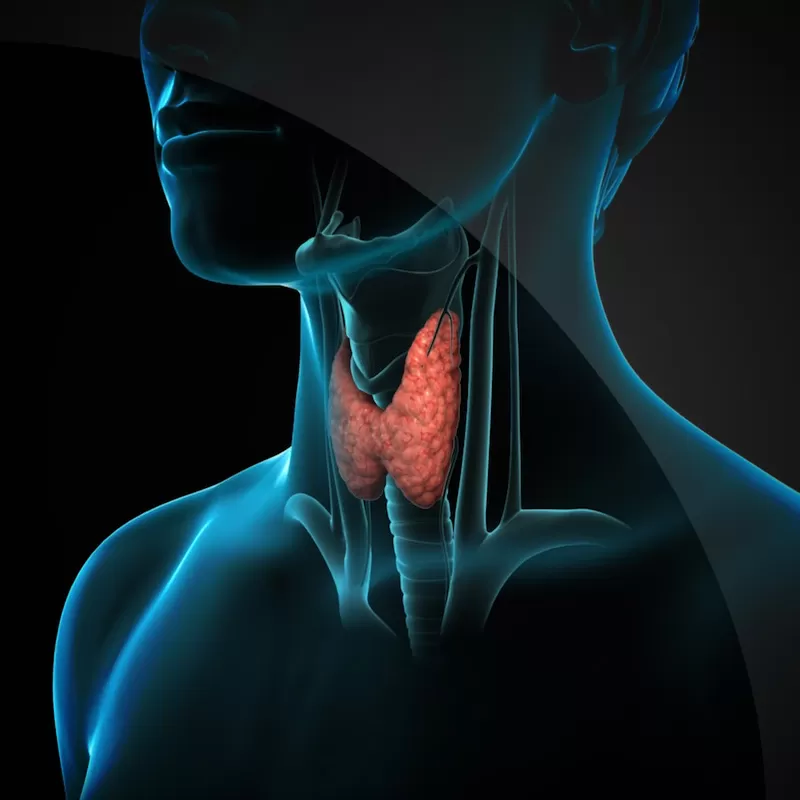Let’s start with the basics of what is a thyroid gland
A thyroid gland is butterfly shaped which is located just below the Adam’s apple in front of your neck and is a part of the endocrine system. It consists of 2 lobes on either sides of the windpipe (as shown in the picture above). Both these lobes are joined by a tissue called isthmus. The size of each of the lobes is almost equivalent to that of a half cut plum. It secretes 2 hormones called Thyroxine(T4) as well as Triiodothyronine (T3) which are very beneficial for all cells to work properly in your body.
Who gets this disease?
Although it’s very common to have thyroid disorders in all genders and age groups, women are more prone to it. One in every 20 people is inflicted by this disorder which could be temporary as well as permanent.
What does the thyroid gland do?
The thyroid makes T3 and T4 and then secretes it into the bloodstream. Thyroxine which is also called T4, consists of 4 atoms of iodine, and Triiodothyronine which is also called T3 consists of 3 tons of iodine. Our body converts this T4 into T3 in the cells and tissues, which is mainly what influences all the activities of the cells & tissues of the body.
What do my thyroid hormones do for me?
The T3 derived which is derived from T4, is secreted by the gland which helps in the metabolism of our body cells – basically meaning in simpler words that it regulates the speed with which your body cells work.
What could go wrong with my thyroid?
Hyperthyroidism– This is when the cells work faster than normal because of excess secretion, which might result in increased activity of your body organs and cells.
Hypothyroidism– This is when too little of the hormones are released and the activities of your body organs and cells slow down.
Goitre– This refers to the enlargement of the thyroid gland
What are the causes for thyroid disorder?
There are multiple causes responsible for thyroid disorders . One of the most common ones being those of autoimmune thyroid disease, which is a self-destructive process, wherein the body’s immune system attacks the thyroid cells, as they consider them as foreign. As a result, the gland then becomes either overactive (hyperthyroidsm) or underachieve (Hypothyroidsm).
Thyromeric and Thyroid Health
- Turmeric, which is one of the best natural substances that supports thyroid function as per various studies that have been conducted, states that individuals consuming organic turmeric regularly are less likely to suffer from goiter, which is a symptom of hypothyroidism.
- Also a lot of patients with thyroid and autoimmune thyroid conditions supplement their daily medication with turmeric, whose bio-active component curcumin helps in reducing the damaging effects of the disease on the body.
- People with autoimmune thyroid conditions such as Graves’ Disease and Hashimoto’s Thyroiditis are characterized by an increase in inflammation, and the properties of cur-cumin majorly help in reducing it.
- Curcumin when taken with bromelain helps in reducing inflammation as per the University of Maryland Medical Center. As per another study that was conducted by Deshpande, which also got published in “Indian Journal of Experimental Biology” wherein a rat was induced with drugs causing hypothyroidism and then given curcumin as an antioxidant and the results were that the rat had less cholesterol levels, weighed lesser and had lesser suppressed thyroid hormones v/s rats who did have hypothyroidism however were not given this antioxidant.
- Thyromeric helps in battling this disorder as it consists of various medicinal and therapeutic properties such as anti inflammatory, anti-oxidants , anti-cytotoxic and anti- microbial, however one must ensure precaution as it is not meant to replace any medications or treatments your doctor has prescribed for your thyroid condition.
One could add 1 ½ teaspoons of Thyromeric along with some black pepper to plain raw milk or coconut milk and bring to a boil. The black pepper helps to absorb its nutrients more easily into the system.
SO WHAT’S STOPPING YOU FROM TRYING THYROMERIC?
Click here for more details: https://www.ncbi.nlm.nih.gov/pubmed/28265769

